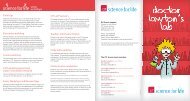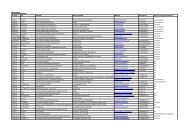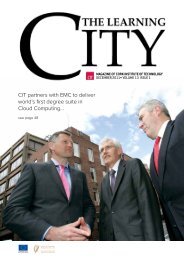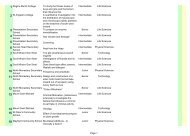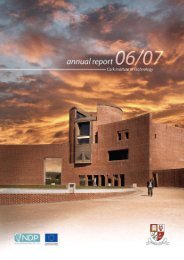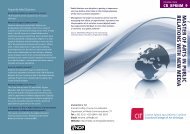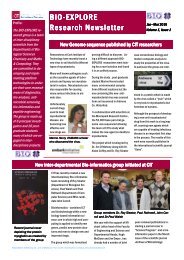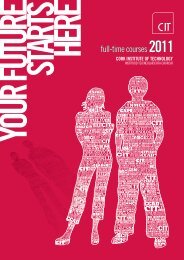biological sciences @cit - Cork Institute of Technology
biological sciences @cit - Cork Institute of Technology
biological sciences @cit - Cork Institute of Technology
You also want an ePaper? Increase the reach of your titles
YUMPU automatically turns print PDFs into web optimized ePapers that Google loves.
Module Information<br />
http://modules.cit.ie/cr330<br />
About the Course<br />
The main core <strong>of</strong> the programme is focused on the<br />
production, characterisation and applications <strong>of</strong> herbal<br />
extracts and natural products that are ingredients used in<br />
medicinal, pharmaceutical, cosmetic and food industries.<br />
The Herbal Science course is structured along streams <strong>of</strong><br />
study based on plant science and plant production, human<br />
body systems, food and nutrition, and herbs and natural<br />
product applications.<br />
The specific <strong>biological</strong> subjects are supported by more<br />
general analytical techniques and foundation skills that<br />
provide our graduates with broad scientific education while<br />
retaining an appropriate level <strong>of</strong> specialisation to <strong>of</strong>fer a wide<br />
range <strong>of</strong> opportunities in industry, in research or in business<br />
development.<br />
Further Studies<br />
For details, see www.cit.ie<br />
Suitable qualified graduates may progress to academic<br />
qualifications in a number <strong>of</strong> areas which include plant<br />
science, pharmacy, ethnobotany, microbiology, and<br />
pharmacognosy at Master’s and Doctoral Degree level.<br />
The course gives the educational foundation necessary to<br />
pursue a career as a medical herbalist. The IIMH accepts<br />
and recognises this BSc Honours Degree as constituting<br />
Part 1 <strong>of</strong> its pr<strong>of</strong>essional training requirement for qualification<br />
as a medical herbalist/practitioner in Ireland. Further study/<br />
training is required to achieve Part 2 <strong>of</strong> the IIMH pr<strong>of</strong>essional<br />
requirements. The course also provides the student with<br />
an enormous opportunity to develop the skills necessary to<br />
commence herbal research or clinical training at an advanced<br />
level.<br />
Career Opportunities<br />
Graduates can expect to work in a variety <strong>of</strong> sectors<br />
including the Healthcare/Cosmetic Industry; Food Industry/<br />
Nutraceutical Industry; Biopharmaceutical Industry; Quality<br />
Control/Analysis; and Medicinal Plant Production.<br />
Contact Information<br />
Anna-Maria Keaveney<br />
Department <strong>of</strong> Biological Sciences<br />
T: 021 433 5402<br />
E: anna-maria.keaveney<strong>@cit</strong>.ie<br />
CIT has developed a website which gives full details <strong>of</strong> all modules<br />
for all courses. The website also has information on recommended<br />
textbooks, average weekly workload, assessments and exams.<br />
Question Time<br />
When I graduate, will I be based in a Lab?<br />
Graduates can work in a variety <strong>of</strong> settings from growing<br />
herbs and extracting natural products to manufacturing<br />
and production in a range <strong>of</strong> industries (cosmetic,<br />
biopharmaceutical, food, etc.). You can chose to work in a<br />
lab undertaking research and product development or quality<br />
control. You can make other choices based on the modules<br />
covered in this course for a wide variety <strong>of</strong> career options and<br />
work placements.<br />
What postgraduate qualification do you need to be<br />
qualified as a Herbalist?<br />
There are a number <strong>of</strong> options available to graduates when it<br />
comes to postgraduate study, including pr<strong>of</strong>essional training<br />
in Herbal medicine. If you chose to specialise in Herbal<br />
Medicine you will need further specialist postgraduate training<br />
accredited by the pr<strong>of</strong>essional body that can be contacted for<br />
further information.<br />
Alternatively you can pursue a research Master’s through CIT’s<br />
Graduate School which can be based in any one <strong>of</strong> a number<br />
<strong>of</strong> life science disciplines. From this you may choose to pursue<br />
a structured PhD such as the ED4LIFE programme which<br />
includes the tradition <strong>of</strong> original research but <strong>of</strong>fers graduates<br />
a range <strong>of</strong> generic and subject specific skills so that they are<br />
industry ready upon graduation. Generic modules include<br />
entrepreneurship, communications, personal effectiveness,<br />
and research methodology.<br />
Many other postgraduate opportunities can be availed <strong>of</strong> in<br />
other third level institutions in Ireland and abroad.<br />
myCIT<br />
myCareer<br />
Tracey Ryan<br />
Company Owner<br />
Tracey graduated in 2011 and has set<br />
up her own business, Bia Beauty.<br />
“I really enjoyed the broad range<br />
<strong>of</strong> subjects studied on the Herbal<br />
Science Degree, from Botany to<br />
Biochemistry. But what really helped<br />
me was the emphasis on Innovation,<br />
Entrepreneurship, and Product and<br />
Process Development.<br />
It was here that I got a taste <strong>of</strong><br />
business from which I have now<br />
set up my own company making<br />
and selling natural cosmetics.<br />
This Degree has prepared me in<br />
many ways to run my business,<br />
from selecting appropriate herbs,<br />
to researching their benefits and<br />
creating a suitable manufacturing<br />
environment.”<br />
9



